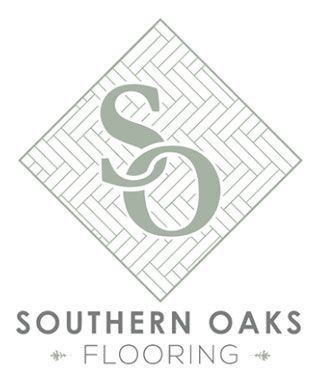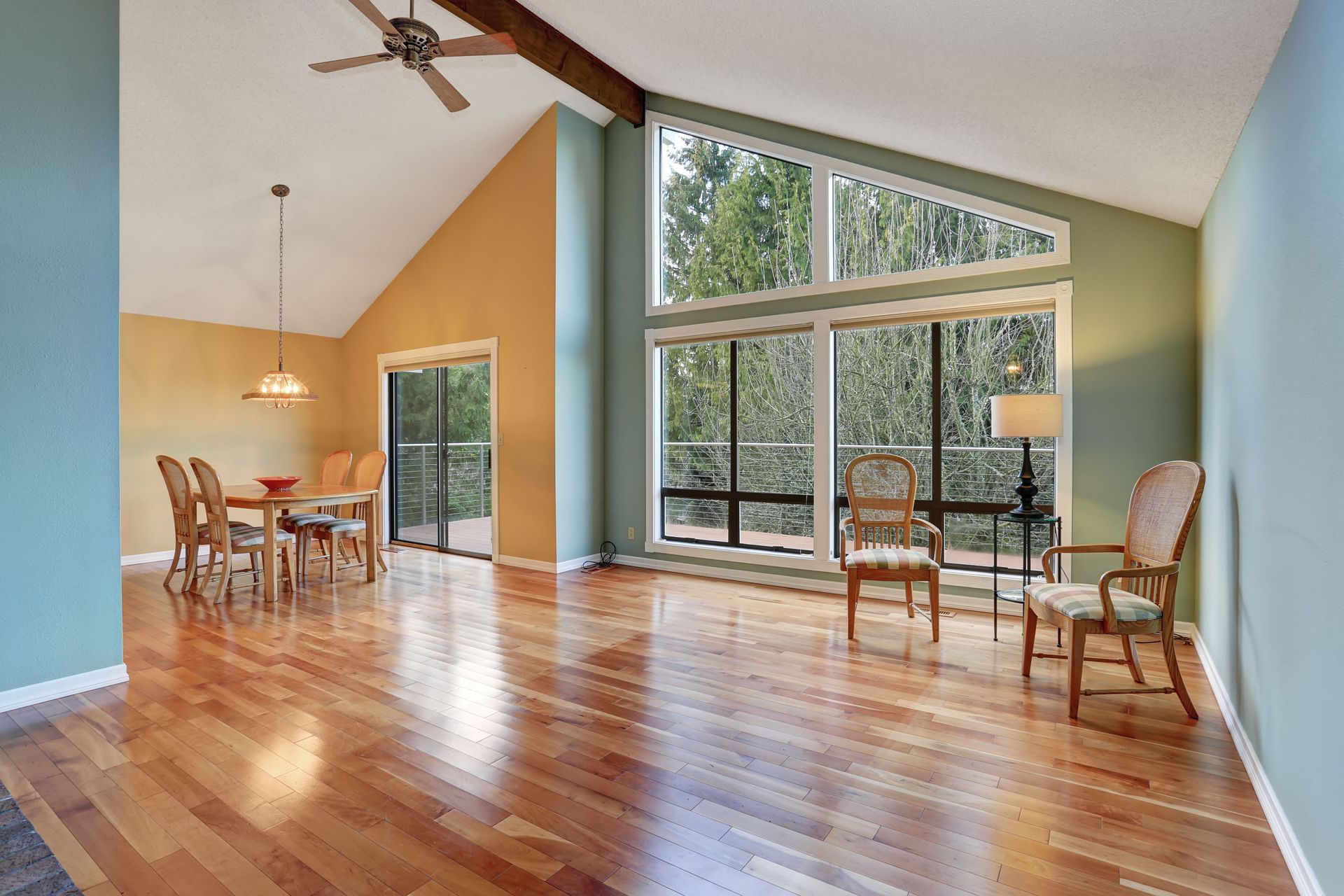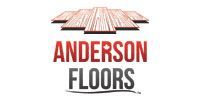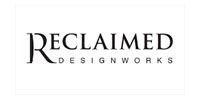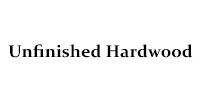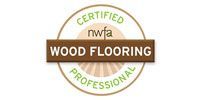November 13, 2025
The two questions we receive most frequently from customers concern solid versus engineered hardwood. "What's the difference between solid and engineered hardwood?" is usually followed by "How do I tell if I have solid or engineered wood floors in my house?" Today we'll shed some light on the first question for ya, paying particular attention to issues related to flooring in the Nashville area.
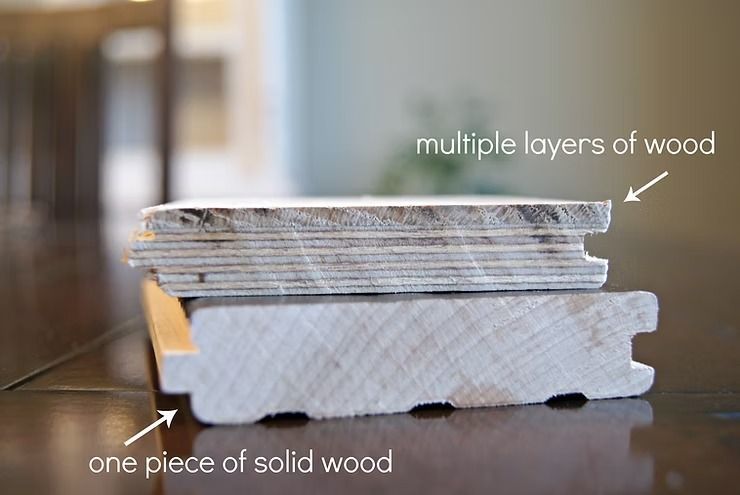
Solid Hardwood
What is solid hardwood?
Solid hardwood flooring is simple enough to understand: each strip or plank is cut from one solid piece of wood without any visible layers. It can vary in thickness from 3/4-in. to 5/16"-in., but 3/4-in. is the most common option.
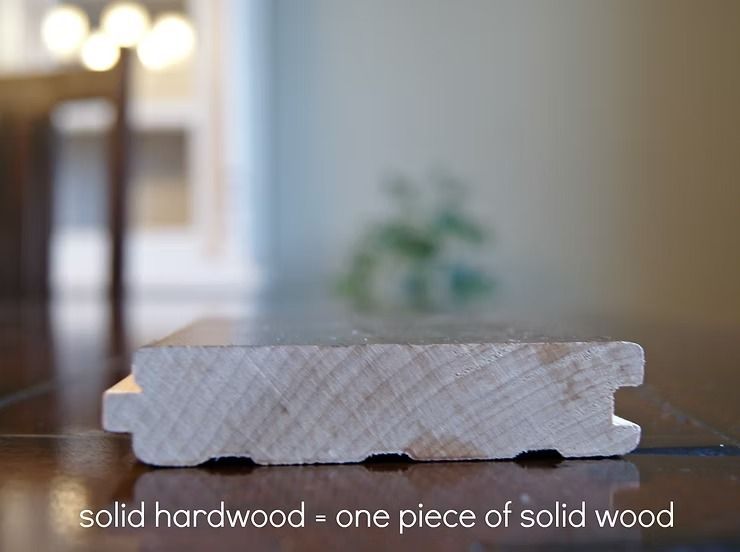
How is it installed?
Solid hardwood is usually nailed down (actually stapled, preferably), although in certain situations it can be glued or floated.
Where can it be installed?
Solid hardwood can be installed on grade or above grade. Grade is simply a way to define where things are in relation to ground level. As you can see from our fancy Photoshop image below, solid hardwood can be installed at ground level or higher. This rules out basements, sunken living rooms, etc.
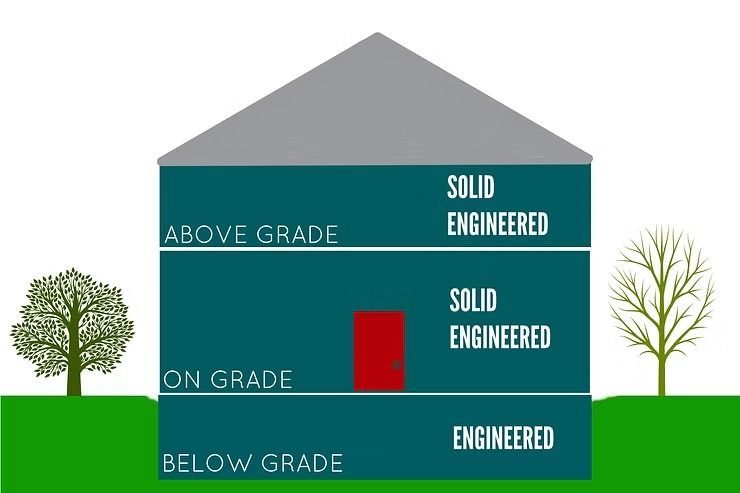
Why can't I install solid hardwood in my basement?
Solid hardwood is au naturale, baby. Imagine if you went outside, cut down a tree, made it into boards, and brought it in your house. It would react to moisture inside your home just as it would if it were still outside as part of a solid tree. Any room below grade naturally has a lot more moisture issues than a room that's above ground, so when water or simply humid air comes into contact with solid wood flooring, it can cause cupping or other distortions to occur.
To see this in action, visit an older home with hardwood flooring in Nashville or elsewhere in the South. Even when moisture from below is not an issue, without air conditioning the humidity we all know and love makes for some pretty bad warping and distortion (not to mention lots and lots of sweaty glistening.) If the floor has not been restored, you'll be able to see the effects of moisture on the wood.
My house is on a concrete slab foundation. Can I install solid hardwood flooring?
Yes and no. Solid wood expands and moves slightly even after it's installed and is less stable than engineered wood. It must be glued down to a concrete foundation and traditionally adhesives have not worked well enough to warrant using them. The past few years have seen a boom in products marketed specifically to allowing installation of solid hardwood on concrete foundations.
The most well-known is Bostik's moisture cure polyurethane adhesive; the company also provides liquid moisture barriers to help prevent cupping and other problems associated with solid hardwood. Elastilon, a product of the Netherlands, has been popular in Europe for quite some time but has finally started making its way to the US. It's a "self-adhesive installation system" that acts as a vapor barrier and allows solid hardwood to be installed on concrete slabs. Another option is simply installing a plywood subfloor over a concrete slab to allow the hardwood to be nailed down.
The downside to all of these options is cost. Numerous engineered flooring options are now available, so the vast majority of customers can find a product they love without adding thousands of dollars to their budget.
Finally, despite being able to, installing solid hardwood on concrete is simply a method we do not recommend. There are too many problems unique to this method that can be avoided by using an engineered wood.
What are the advantages of solid hardwood flooring?
The main advantage of solid hardwood is that it can be sanded and refinished multiple times, greatly extending its life. That's why it's so common to see original hardwood floors in older homes; they can usually be salvaged by sanding and refinishing them until they're as good as new!
Otherwise, choosing solid hardwood over engineered hardwood or any other type of flooring is really a matter of style and personal preference. Both solid and engineered floors add the same value to a home, and the cost is somewhat comparable. Some people simply like the idea of solid hardwood, though, since it's the most traditional style of wood flooring.
Engineered Hardwood
What is engineered hardwood? Is it real wood?
Yes, engineered floors are real hardwood. In fact, most people have a very difficult time telling the difference between solid and engineered wood floors once they are installed. It becomes apparent, however, when looking at a single board.
Instead of one piece of wood, engineered hardwood is made of several layers of wood which alternate directions. This stabilizes the boards, since each layer's ability to expand or contract is limited by the opposing grain above and below it. The top layer is usually pre-finished and of a higher quality than the wood veneers beneath it. That does not mean it is a low quality product; its composition actually makes it more stable than solid hardwood and allows more flexibility in terms of installation.
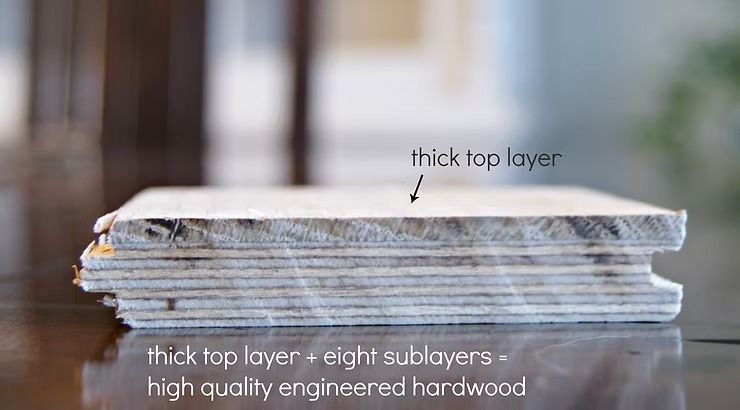
What should I look for in an engineered floor?
Engineered floors have three to 12 sub layers; the more layers the more stable the product. The thickness of the top hardwood veneer ("wear layer") also plays a role in the quality and price. The wear layer varies in thickness from 0.5 mm to 4.5 mm. In general, the thicker the veneer, the higher the quality and the price. Thicker layers extend the life of the floor, since they can be refinished more times.
How many times can an engineered hardwood floor be refinished?
It depends on the thickness of the wear layer. If it is 1 mm or less, it can't be refinished at all, since doing so would expose the plywood underneath. A 2 mm layer can be refinished once or twice, 3 mm can be refinished three or four times, and anything over 4 mm can be refinished three to five times, depending on the floor.
How is it installed?
Depending on various factors, engineered flooring can be nailed, glued, or floated (adhesive is placed on the tongue and groove of each board and fitted together but does not actually adhere to the subfloor itself.) Because there are so many variables that determine how your floor should be installed, it's best to discuss this with us during your free consultation.
Where can engineered flooring be installed?
Because of the added stability from its wood veneer layers, engineered flooring can be installed in every area of a home, including basements and other below grade areas. If you need a visual, here's our diagram again. We're always happy for another chance to show off my mad Photoshop skills.

My house is on a concrete slab foundation. Can I install engineered hardwood?
Yep. In fact, that's why it was first developed!
What are the advantages of engineered hardwood flooring?
Those customers who choose engineered hardwood like it because it can be installed anywhere in their home, whether it's below grade, on a concrete slab, or anywhere else for which solid hardwood is not recommended. Its stability and durability also attract customers. It's price varies greatly depending on the quality of the material, but in general it's slightly less expensive than solid hardwood.
I live in the Nashville area and I'm not sure what kind of foundation I have or whether the floors in my home are solid or engineered. Can you help me?
We'd be glad to. Call us at (615) 416-9039 or email jared@southernoaksflooring.com and we'll be happy to schedule a free consultation. If you're not interested in changing your floors just yet, it's still a great opportunity to ask questions and gain a better understanding of the specific issues or concerns related to your flooring.
#flooringnashville #solidhardwood #engineeredhardwood #flooringconcreteslab #solidvsengineered #solidhardwoodflooring


